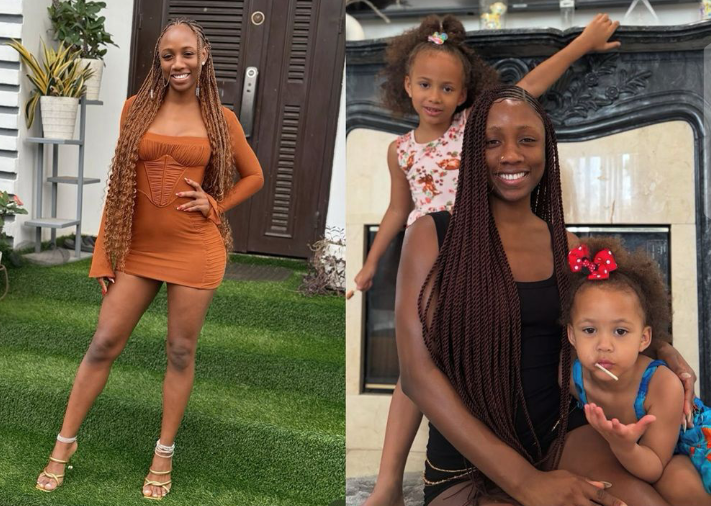
Big Chop, Big Shock: Korra Obidi Blasts Ex-Husband Over Daughters’ Haircut Without Her Consent

In a startling moment that has set social media abuzz and reignited conversations around co-parenting boundaries, Nigerian dancer and singer Korra Obidi has taken to the internet to call out her ex-husband, Justin Dean, for allegedly cutting their daughters’ hair without informing or consulting her. The entertainer, known for her vibrant presence online and her candidness about her personal life, shared her shock and disappointment over what she described as a “big chop” that occurred behind her back.
The viral incident came to light when Korra posted a video on her social media platforms, visibly distraught, questioning the decision made by her ex. “Na so dem dey do co-parenting for this America?” she asked in a heart-wrenching tone, her expression a mixture of disbelief and pain. She continued, “What will you do in my situation? A big chop without any communication?” Her words resonated deeply with many parents and supporters who could feel her sense of helplessness as a mother feeling excluded from a major decision in her children's lives.
Korra and Justin, who were once a power couple on social media, have had a turbulent relationship, one that has not been shy of public scrutiny since their separation. Their split was followed by a very public co-parenting arrangement involving their two daughters. While they have tried to maintain a somewhat stable front for the sake of their children, this recent incident seems to have pushed Korra to a boiling point.
The video, which has now amassed thousands of views and sparked countless comments, shows Korra looking visibly shaken, cradling the head of one of her daughters, whose hair had been cut down significantly. While some may view a haircut as trivial, in many cultures—particularly in African households—a child's hair is deeply symbolic. From cultural heritage to a mother’s personal care rituals, a child's hair often holds sentimental and emotional value, especially to mothers who consider themselves their children's first groomers.
“I didn't even get a message. Not even a heads-up,” Korra said, her voice laced with frustration. “You wake up one day, and the next thing you know, your baby’s hair is gone. Who does that?” Her outcry reflects the ongoing challenges that many divorced or separated couples face when trying to navigate co-parenting without proper communication or mutual respect. It’s a scenario that echoes in many homes across the globe, but Korra’s celebrity status has given this moment a spotlight that reignites an important societal dialogue.
As expected, the internet quickly divided into camps. Supporters of Korra poured in with empathetic comments, mostly from mothers who understood the significance of being left out of such a decision. “That’s not just a haircut—it’s a memory, a milestone. He should have asked you first,” one follower commented. “That man is out of line,” wrote another. Some even shared their personal stories of similar co-parenting challenges, creating a thread of shared frustrations and emotional triggers.
On the other hand, some critics questioned whether a haircut should really cause such an uproar. “It’s just hair, it’ll grow back,” some argued, while others accused Korra of blowing things out of proportion or using the moment for clout. But what critics seem to overlook is the larger issue at play: the erosion of communication and trust in a co-parenting relationship, especially one that is already fragile from past conflicts.
Justin Dean has yet to publicly respond to the allegations or the video, but this silence has only intensified speculation and discussion. The lack of communication, which is the central grievance in Korra’s video, highlights how easily parenting conflicts can escalate when basic boundaries and respect are not upheld. For many, the incident is not just about hair—it’s about control, consideration, and shared responsibility.
This isn’t the first time that Korra and Justin’s co-parenting journey has made headlines. From custody disagreements to public arguments, their relationship post-divorce has seen many turbulent turns. But Korra’s emotional appeal over something as seemingly small as a haircut has resonated because it peels back the layers of emotional labor that many mothers quietly carry. It speaks to the emotional toll of being sidelined in decisions concerning one’s children and the frustration that comes from constantly having to assert one’s place as an equal parent.
The video has also sparked conversations about cultural differences in parenting practices. Korra, who hails from Nigeria, may hold different values and sentiments around hair care and children’s appearance compared to Justin, an American. This cultural clash, though unspoken, adds another layer to the conflict, showing just how nuanced co-parenting can become when personal, emotional, and cultural values collide.
As the dust continues to settle on this viral confrontation, many are calling for better co-parenting education and mediation for separated couples. The reality is, whether in America, Nigeria, or anywhere else, parenting after a breakup requires ongoing communication, respect, and empathy. It’s a delicate dance that must prioritize the well-being of the children above all else, even when emotions run high.
For Korra, the haircut incident seems to have cut deeper than the strands of hair lost. It represented yet another moment where she felt voiceless in the lives of her children. And while hair can grow back, the wounds caused by lack of consideration may take longer to heal. As she continues to share her journey online, many will be watching—some in support, others in scrutiny—but the core issue remains: when it comes to co-parenting, is a mother’s voice still heard loud and clear?
Only time will tell how this situation unfolds, but for now, Korra’s cry has sparked a global conversation that may lead many separated parents to reflect on how they make decisions that affect their children—and the importance of making those decisions together.


